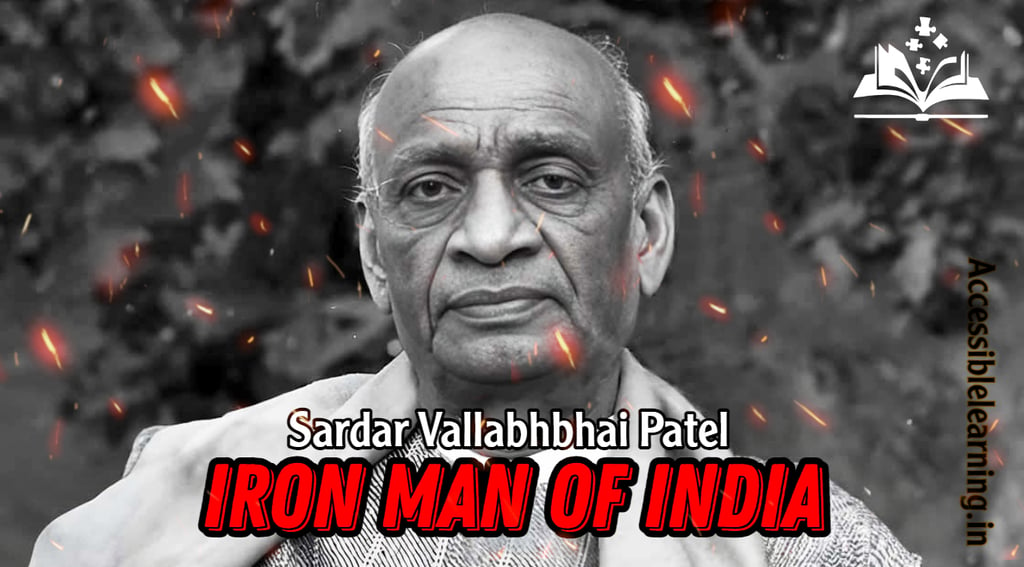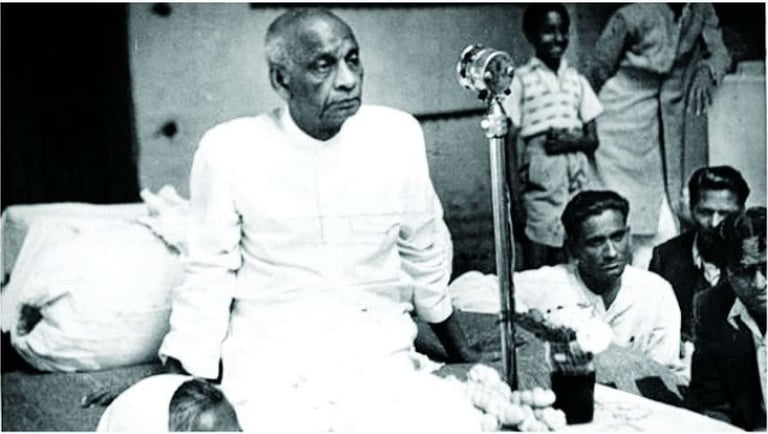
Sardar Vallabhbhai Patel: Architect of Modern India
The title of "Iron Man of India" is usually attributed to Vallabhbhai Patel, who was one of the key figures in India's struggle for independence from British rule. Vallabhbhai Patel played an important role in unifying various princely states and territories into the Republic of India after independence in 1947. He was known for his strong leadership, determination and efforts to integrate the diverse regions of India into one nation. Patel's contribution in uniting the country due to his determination and strength earned him the title of "Iron Man of India".
BIOGRAPHY/HISTORYTHE GREAT LEADERINDIAN HISTORYEDUCATION/KNOWLEDGEHISTORY
Sachin K Chaurasiya
4/3/20243 min read


In the tumultuous era of India's struggle for independence, amidst the enthusiasm of countless leaders, one personality stands out with his towering presence—Sardar Vallabhbhai Patel (सरदार वल्लभभाई पटेल). Often referred to as the "Iron Man of India," Patel's legacy is deeply engraved in the annals of Indian history, marking him not only as a freedom fighter but also as the architect of modern India. His remarkable leadership, unwavering determination, and vision for a united nation will continue to inspire generations.
Born on October 31, 1875, in Nadiad, Gujarat, Vallabhbhai Patel was imbued with the spirit of justice and righteousness since childhood. His journey to becoming a legendary leader began with a legal career, where he established himself as a brilliant barrister. However, his true calling was in the service of the nation, and he soon involved himself in the Indian independence movement, inspired by the ideals of Mahatma Gandhi.
One of Patel's most significant contributions to India's freedom struggle was his role in the Bardoli Satyagraha of 1928. In response to the oppressive taxation policies imposed by the British, Patel led the farmers of Bardoli in a non-violent resistance movement, earning him the title of "Sardar" "or leader. The successful outcome of the Bardoli Satyagraha not only brought relief to the farmers but also gave Patel national prominence as a strong leader.


However, it was Patel's unique skills in statecraft and diplomacy that truly set him apart. After India's independence in 1947, the country faced the difficult task of integrating more than 500 princely states into the newly formed nation. The responsibility of this great endeavor fell to Patel, who accepted this difficult challenge with characteristic determination and practicality.
Patel's masterstroke came in the form of the "Instrument of Accession," a legal document through which the princely states agreed to accede to India. Through a combination of negotiation, persuasion, and, when necessary, pressure, Patel successfully convinced most of the princely states to join the Indian Union. His skillful diplomacy and deftness in the integration process ensured that India emerged as a unified nation rather than a fragmented entity.
Perhaps the greatest achievement of Patel's political career was the merger of the princely state of Hyderabad in 1948. Facing resistance from the ruling Nizam and Razakars, Patel decisively ordered a military intervention, known as "Operation Polo," which rapidly annexed Hyderabad to India. Control. The successful unification of Hyderabad not only strengthened the territorial integrity of India but also demonstrated Patel's unwavering commitment to the unity and sovereignty of the nation.
Sadly, Sardar Vallabhbhai Patel's life ended on 15 December 1950, leaving behind a legacy that inspires admiration and respect even today. His vision of a united, prosperous, and inclusive India is as relevant today as it was during his lifetime. In recognition of his unique contributions, the Government of India celebrates his birth anniversary on 31 October as "National Unity Day," underscoring the enduring importance of Patel's ideals in promoting national unity and integration.

As India moves into the 21st century navigating the complexities of a rapidly changing world, the legacy of Sardar Vallabhbhai Patel serves as a guide, reminding us of the importance of unity, integrity and statesmanship in shaping the destiny of the nation. Reminds me of the power of. Indeed, he remains the architect of modern India, a great personality whose indelible mark on the country's history will remain for generations to come.
Subscribe to our newsletter
All © Copyright reserved by Accessible-Learning
| Terms & Conditions
Knowledge is power. Learn with Us. 📚


